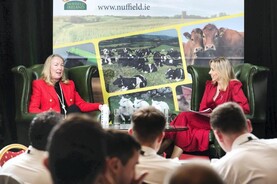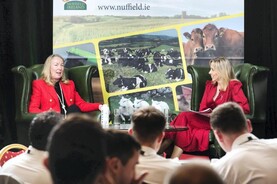Nuffield scholar Brendan Crosse says Ireland should embark on establishing a sheep milking sector “in a big way”.
Crosse, who set up his dairy flock in 2017 with brother Michael, has found that farm incomes from milking sheep could match those from milking cows, with 30-40% less greenhouse gas emissions.
Furthermore, the Tipperary farmer says there is a gap in the global 10.5bn litre sheep milk market, and that Ireland, with its green credentials and reputation for animal welfare, is positioned to take advantage.
Crosse, who is due to speak at the Nuffield Ireland annual conference on Friday, told the Irish Farmers Journal that there is an “initial sustainable demand” for 100m litres of sheep milk from Ireland. There are five farmers currently in operation.
Supply drop
According to Crosse, the output from the world’s largest sheep milk producing region, the Mediterranean, has fallen due to rising input costs, drought and an aging farmer population. He says this output reduction is set to continue and Ireland should invest now to capitalise.
“Over the next five to 10 years, Ireland could put 100,000 to 120,000 [milking] sheep on the ground, making up the supply,” he said.
Nutritionally, Crosse says sheep milk has 50% more protein and fat than cow and goat milk, 70% more calcium and a rich vitamin and mineral profile. He says recent studies indicate that it is also easier to digest, allowing it to be marketed for lactose-intolerant consumers.
Irish Farmers Journal analysis of the market shows that sheep milk prices ranges from 90c/l to 160c/l.
Potential system
The Nuffield scholar suggested that a farmer milking 600 ewes on 100ac would make the same amount of money as a farmer with 110 dairy cows.
While intensive sheep dairy farms in the Mediterranean operate off 450-500l lactations for ewes, Crosse said 280-300l lactations would be a “nice sustainable target” for Ireland.
In his own flock, he said lambs are reared on the ewes for 30 days and then artificially reared beyond this. He says this approach reduces costs and labour and would align well for a high animal welfare product.
“Six hundred sheep on 100ac, it’d be a one man show. The ewes rear the lambs for a month and then you milk for six months,” he said. Crosse said it is this model that would return a “very similar income” as milking cows does.
“You’d also have the ability to operate off a smaller holding, no need for slurry storage.” Depending on farm type, he said farmers could be facing initial set up costs “as low as €100,000” for this kind of system.
The Tipperary farmer said sheep dairying would be suitable in areas of the country not suited to milking cows.
Crosse hopes to raise the opportunities in sheep milking with Minister for Agriculture Charlie McConalogue, Teagasc and other stakeholders.
The Nuffield Ireland conference will take place on Friday, 18 November in the Castleknock Hotel, Dublin 15 from 9.15am, where 2021 Nuffield scholars Brendan Crosse, Alex Eivers, Brian McCarthy and Ray Ó Foghlú will deliver their reports after completion of their two-year research and travel programmes.
Read more
Nuffield Ireland announces new chair and 2022 conference lineup
Nuffield scholar Brendan Crosse says Ireland should embark on establishing a sheep milking sector “in a big way”.
Crosse, who set up his dairy flock in 2017 with brother Michael, has found that farm incomes from milking sheep could match those from milking cows, with 30-40% less greenhouse gas emissions.
Furthermore, the Tipperary farmer says there is a gap in the global 10.5bn litre sheep milk market, and that Ireland, with its green credentials and reputation for animal welfare, is positioned to take advantage.
Crosse, who is due to speak at the Nuffield Ireland annual conference on Friday, told the Irish Farmers Journal that there is an “initial sustainable demand” for 100m litres of sheep milk from Ireland. There are five farmers currently in operation.
Supply drop
According to Crosse, the output from the world’s largest sheep milk producing region, the Mediterranean, has fallen due to rising input costs, drought and an aging farmer population. He says this output reduction is set to continue and Ireland should invest now to capitalise.
“Over the next five to 10 years, Ireland could put 100,000 to 120,000 [milking] sheep on the ground, making up the supply,” he said.
Nutritionally, Crosse says sheep milk has 50% more protein and fat than cow and goat milk, 70% more calcium and a rich vitamin and mineral profile. He says recent studies indicate that it is also easier to digest, allowing it to be marketed for lactose-intolerant consumers.
Irish Farmers Journal analysis of the market shows that sheep milk prices ranges from 90c/l to 160c/l.
Potential system
The Nuffield scholar suggested that a farmer milking 600 ewes on 100ac would make the same amount of money as a farmer with 110 dairy cows.
While intensive sheep dairy farms in the Mediterranean operate off 450-500l lactations for ewes, Crosse said 280-300l lactations would be a “nice sustainable target” for Ireland.
In his own flock, he said lambs are reared on the ewes for 30 days and then artificially reared beyond this. He says this approach reduces costs and labour and would align well for a high animal welfare product.
“Six hundred sheep on 100ac, it’d be a one man show. The ewes rear the lambs for a month and then you milk for six months,” he said. Crosse said it is this model that would return a “very similar income” as milking cows does.
“You’d also have the ability to operate off a smaller holding, no need for slurry storage.” Depending on farm type, he said farmers could be facing initial set up costs “as low as €100,000” for this kind of system.
The Tipperary farmer said sheep dairying would be suitable in areas of the country not suited to milking cows.
Crosse hopes to raise the opportunities in sheep milking with Minister for Agriculture Charlie McConalogue, Teagasc and other stakeholders.
The Nuffield Ireland conference will take place on Friday, 18 November in the Castleknock Hotel, Dublin 15 from 9.15am, where 2021 Nuffield scholars Brendan Crosse, Alex Eivers, Brian McCarthy and Ray Ó Foghlú will deliver their reports after completion of their two-year research and travel programmes.
Read more
Nuffield Ireland announces new chair and 2022 conference lineup






 This is a subscriber-only article
This is a subscriber-only article










SHARING OPTIONS: